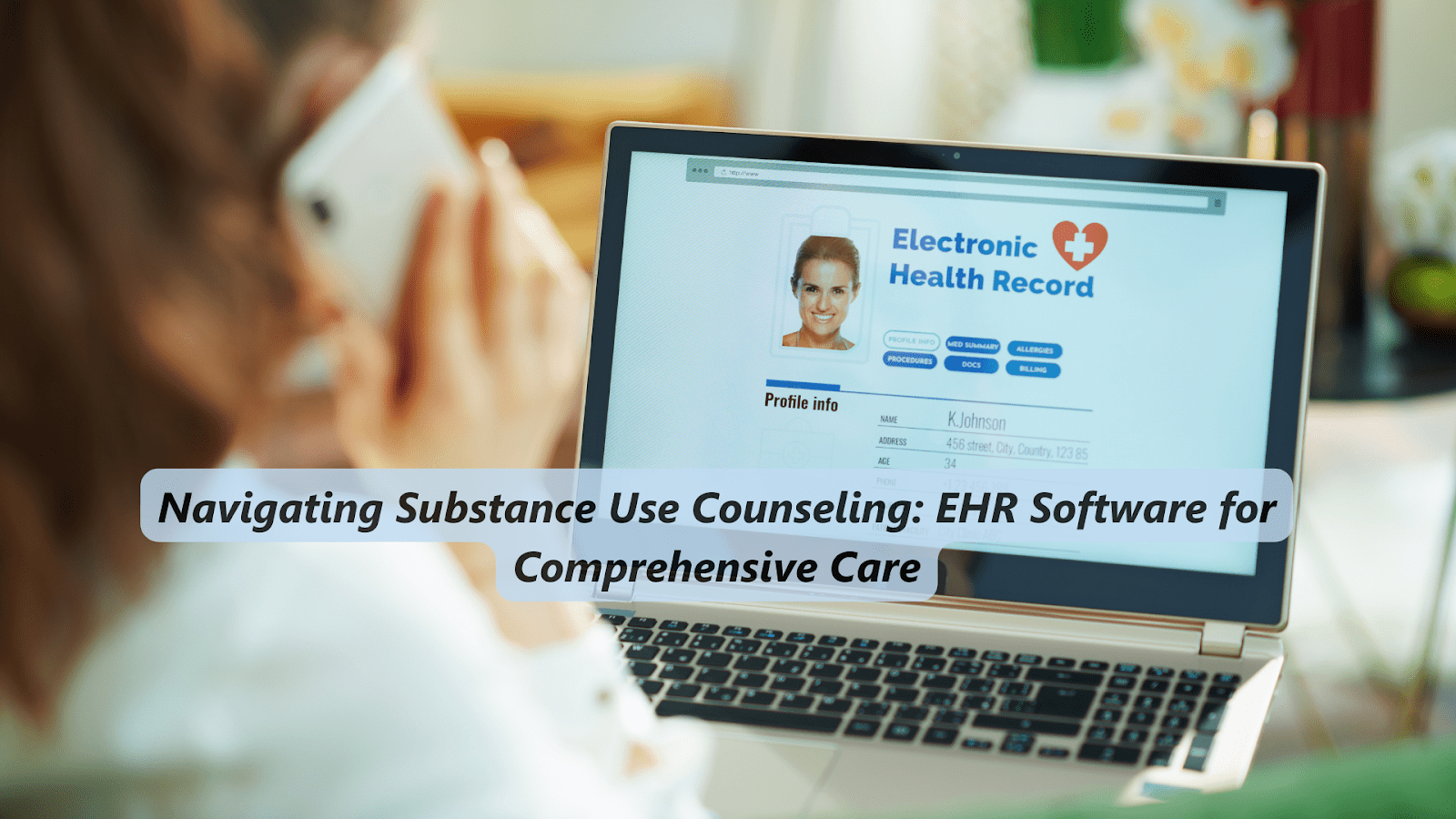If you’re facing challenges in providing comprehensive and integrated care for patients with substance use disorders, do you find it challenging to coordinate with different healthcare providers, track patient histories, and manage medications seamlessly? know you’re not alone. Navigating the complexities of substance use counseling can be daunting, but there’s a solution that can transform your practice: Electronic Health Records (EHR) software.
In an era where holistic and personalized care is paramount, EHR software has emerged as a game-changer, enabling substance use counselors to leverage the power of technology to deliver comprehensive and integrated treatment. Given that less than 8% of individuals with co-occurring disorders received combined care for mental health and substance abuse in 2018, the need for a collaborative and multidisciplinary approach has never been more pressing. EHR software bridges this gap, facilitating seamless communication, streamlining workflows, and empowering counselors with essential tools for exceptional care.
The Imperative of Integrated Care
Substance use disorders often coexist with mental health conditions, necessitating a holistic approach to address the intertwined complexities. Integrated care transcends siloed treatment methods, offering a coordinated framework where substance use counselors, mental health professionals, and other healthcare providers collaborate seamlessly.
This strategy enhances treatment efficacy and fosters a patient-centric environment, prioritizing care plans tailored to individual needs.
Leveraging EHR Software for Substance Use Counseling
Robust EHR systems equip counselors with an array of features that streamline operations and elevate the quality of care. For those seeking comprehensive EHR software for mental health, these systems provide advanced tools tailored to the unique needs of substance use counseling. As the adoption of EHR software for substance use disorder treatment accelerated to 69.2% of programs by 2017, its transformative potential became increasingly evident.
Patient History Tracking
Effective substance use counseling is grounded in comprehensive patient history documentation. EHR software consolidates intricate details, including past treatments, medications, family histories, and psychosocial factors, into a centralized digital record. This level of accessibility empowers counselors to make informed decisions, identify potential risk factors, and tailor interventions accordingly.
Medication Management
For individuals battling substance use disorders, medication plays a pivotal role in recovery. Mental health professionals incorporates advanced medication management capabilities, enabling counselors to track prescriptions, monitor adherence, and mitigate potential drug interactions or adverse reactions. This heightened oversight not only enhances patient safety but also optimizes treatment outcomes.
Appointment Scheduling and Reminders
Consistency is crucial in substance use counseling, and behavioral health EHR systems offer robust appointment scheduling and reminder functions. With the ability to seamlessly coordinate appointments across multidisciplinary teams, counselors can ensure uninterrupted continuity of care, reducing the risk of lapses that could jeopardize a patient’s recovery journey.
Secure Messaging and Collaboration
Effective communication among care providers is paramount in integrated care models. Psychiatric EHR solutions facilitate secure messaging and collaboration tools, enabling counselors, physicians, and other stakeholders to exchange information, coordinate treatment plans, and address emerging concerns promptly. This streamlined communication framework promotes cohesive care delivery and enhances overall treatment efficacy.
Customizable Workflows
Every substance use counseling practice is unique, with its own methodologies, protocols, and operational nuances. The best behavioral health EHR systems offer customizable workflows that can be tailored to align with specific counseling approaches, ensuring a seamless integration into existing processes and minimizing disruptions to established practices.
| Feature | Description |
| Patient History Tracking | Consolidates patient details like past treatments, medications, family histories, and psychosocial factors into a centralized digital record for informed decision-making and tailored interventions. |
| Medication Management | Tracks prescriptions, monitors adherence, and mitigates potential drug interactions or adverse reactions, enhancing patient safety and optimizing treatment outcomes. |
| Appointment Scheduling and Reminders | Coordinates appointments across multidisciplinary teams, ensuring continuity of care and reducing the risk of lapses that could jeopardize recovery. |
| Secure Messaging and Collaboration | Facilitates secure communication and information exchange among care providers, enabling coordinated treatment plans and prompt addressing of emerging concerns. |
| Customizable Workflows | Offers the ability to tailor workflows to align with specific counseling approaches, ensuring seamless integration into existing processes and minimizing disruptions. |
Prioritizing Compliance and Security
In substance use counseling, preserving patient confidentiality is paramount. The Substance Abuse and Mental Health Services Administration (SAMHSA) established stringent regulations under Part 2 to safeguard the privacy of SUD patient records. Reputable EHR software employs robust security measures, such as data encryption, role-based access controls, and audit trails, ensuring strict compliance with HIPAA and other regulations.
Enhancing Patient Engagement and Outcomes
Beyond improving operations, EHR systems can significantly enhance patient engagement and, as a result, improve treatment outcomes. Patient portals and mobile applications empower individuals to actively participate in their care journey, facilitating secure messaging with providers, accessing educational resources, and tracking their progress. Increased involvement has been linked to improved treatment adherence, fostering accountability and supporting sustainable recovery.
Despite the potential benefits, in 2017, only 23% of SUD treatment clinics regularly involved patients in care decision-making processes. Embracing patient-centered EHR solutions allows substance use counseling practices to bridge this gap, fostering an environment that values patient autonomy and encourages better treatment utilization.
Leveraging Data Analytics and Reporting
In a time where data-driven decisions are paramount, behavioral health EMR software provides invaluable analytics and reporting capabilities. Harnessing the wealth of information within the system enables counselors to identify patterns, monitor treatment progress, and adjust care plans based on evidence. This data-driven approach not only optimizes individual outcomes but also contributes to advancing substance use counseling practices on a broader scale.
Additionally, comprehensive reporting tools streamline accreditation processes and grant applications, helping ensure counseling centers access necessary resources for exceptional care.
Overcoming Implementation Challenges
Although EHR software offers undeniable benefits for mental health providers, implementing it comes with its challenges. Challenges often include staff training, migrating data from legacy systems, and customizing the system to meet unique operational needs.
Effectively overcoming these obstacles requires partnering with reputable EHR vendors providing comprehensive implementation support, ongoing training, and dedicated resources for a smooth transition. Fostering open communication, addressing staff concerns, and cultivating a culture of continuous learning can further facilitate a successful EHR adoption.
Future Trends and Innovations
The EHR software landscape for substance use counseling constantly evolves, with new technologies set to revolutionize care delivery. AI and machine learning algorithms have immense potential for analyzing vast datasets, identifying risk factors, and personalizing treatment plans with unprecedented precision.
Moreover, telehealth services’ rapid growth has spurred the development of EHR systems optimized for remote care. As substance use counseling embraces the convenience and accessibility of virtual consultations, EHR solutions are adapting to support seamless integration of telehealth services, ensuring continuity of care regardless of geographical barriers.
Final Thoughts
As the demand for holistic and personalized substance use counseling continues to grow, embracing EHR software emerges as a strategic imperative. By leveraging the power of technology, counselors can navigate the complexities of integrated care, streamline operations, enhance patient engagement, and drive better outcomes. With a future brimming with innovative advancements, EHR systems stand poised to shape the landscape of substance use counseling, paving the way for a paradigm shift towards truly comprehensive and patient-centric care delivery.
Frequently Asked Questions
1. How can EHR software accommodate the specific needs of different substance use counseling methodologies?
The best EHR systems for mental health professionals offer a high degree of flexibility and customization options. From tailored templates and workflows to configurable data fields and reporting capabilities, counselors can mold the software to align with their preferred counseling approaches, ensuring a seamless integration into their existing practices.
2. What are the key factors to consider when selecting an EHR system for a substance use counseling practice?
When evaluating EHR software for therapists, it is crucial to consider factors such as functionality, ease of use, scalability, interoperability with other systems, vendor support, and compliance with regulatory requirements. Additionally, assess the software’s ability to accommodate the unique needs of substance use counseling, such as specialized treatment plans, medication management, and patient engagement tools.
3. Can EHR software improve collaboration between substance use counselors and other healthcare providers?
Absolutely! Behavioral health EHR systems prioritize interoperability, enabling seamless communication and information exchange between counselors, physicians, therapists, and other care providers involved in a patient’s treatment journey. This interconnectivity fosters a collaborative environment, ensuring all stakeholders are aligned and working towards a common goal of delivering comprehensive, integrated care.


